- Home
- Steven Brust
Phoenix Page 2
Phoenix Read online
Page 2
"All right. What sorts of things?"
"Size, location of the capital city that kind of stuff. Maps would be good, both of the island and of the capital city."
"That shouldn't take long. I'll have it by this evening."
"Good. And I don't want anyone to know you're after the information. This job might cause a stir and I don't want to be attached to it."
"Okay. What about South Adrilankha?"
"What about it?"
"Any special instructions?"
"No. You know what I've been doing; keep it going. No need to rush anything." "Okay. Good luck." "Thanks."
* * * *
I climbed the stairs to my flat slowly, unaccountably feeling like an old man. Loiosh flew over and began necking (quite literally) with his mate, Rocza. Cawti was wearing green today, with a red scarf around her neck that highlighted the few, almost invisible freckles on her nose. Her long brown hair was down and only haphazardly brushed, an effect I rather like. She put down her book, one of Paarfi's "histories," and greeted me without coolness, but without the pretense of great warmth, either. "How was your day?" I asked her.
"All right," she said. What could she say? I wasn't terribly interested in the details of her activities with Kelly and his band of rebels, or nuts, or whatever they were. She said, "Yours?"
"Interesting. I saw Noish-pa."
She smiled for the first time. If we had anything at all in common at that point, it was our love for my grandfather. "What did he say?"
"He's worried about us."
"He believes in family."
"So do I. It's inherited, I suspect."
She smiled again. I could die for that smile. "We should speak to Aliera. Perhaps she's isolated the gene." Then the smile was gone, leaving me looking at the lips that had held it. I looked into her eyes. I always used to look into her eyes when we made love. The moment stretched, and I looked away, sat down facing her. I said, "What are we going to do?" My voice was almost a whisper; you'd never know we had already had this conversation, in various forms, several times.
"I don't know, Vladimir. I do love you, but there's so much between us now."
"I could leave the Organization," I said. This wasn't the first time I'd said that.
"Not until and unless you want to for your own reasons, not because I disapprove." It wasn't the first time she'd said that, either. It was ironic, too; she'd once been part of one of the most feared teams of assassins ever to haunt the alleys of Adrilankha.
We were silent for a while, while I tried to decide how to tell her about the rest of the day's events. Finally I said, "I'm going to be leaving for a while."
"Oh?"
"Yeah. A job. Out of town. Across the great salt sea. Out past the horizon. To sail beyond the—"
"When will you be back?"
"I'm not sure. Not more than a week or two, I hope."
"Write when you find work," she said.
Lesson Two
Transportation
I can't tell you much about Northport (which ought to have been called Westport, but never mind) because I didn't really see it. I saw the area near the waterfront, which compared pretty poorly to the waterfront of Adrilankha. It was dirtier and emptier, with fewer inns and more derelicts. It occurred to me in the first few minutes, before I'd even recovered from the teleport that this was because Adrilankha was still a busy port, whereas North-port had never recovered from Adron's Disaster and the Interregnum.
Yet there were, once or twice a day, ships that left for Elde or returned from there, as well as a few that went up and down the coast. Of the ships leaving for Elde, many stopped at Greenaere, which was more or less on the way, taking tides and winds into account. (Personally I knew nothing about tides or winds, but as I also knew almost nothing about where these islands could be found, I had no trouble believing what I was told.)
In any case, I located a ship in less than an hour and had only a few hours' wait. I had arrived in the early afternoon. We weighed anchor just before dusk.
I sometimes wonder if sailors don't get lessons in how to do strange and confusing things, just to impress the rest of us. There were ten of them, pulling on ropes, tying things, untying things, setting boxes down, and striding purposefully along the deck. The captain introduced herself as Baroness Mul-something-or-other-inics, but the name I caught was Trice, when they didn't call her "Captain." She was stocky for a Dragaeran, with a pinched-in face and an agitated manner. The only other officer was named Yinta, who had a long nose over a wide mouth and always looked like she was half asleep.
The captain welcomed me aboard with no great enthusiasm and a gentle request to "keep your arse out of our way, okay, Whiskers?" Loiosh, riding on my shoulder, generated more interest but no comments. Just as well. The ship was one of those called a "skip"; intended, I'm told, for short ocean jaunts. She was about sixty feet long, and had one mast with two square sails, one with a little triangular sail in front, and a third holding a slightly larger square one in back. I settled down on the deck between a couple of large barrels that smelled of wine. The wind made nice snapping sounds on the sails as they were secured, at which time some ropes were undone and we were pushed away from the dock by a couple of shore hands wielding poles I couldn't have lifted. Shore hands, crew, and officers were all of the House of the Orca. The mast held a flag which showed an orca and a spear and what looked like the tower of a castle or fort.
Before leaving, I had been given a charm against seasickness. I touched it now and was glad it was there. The boat went up and down, although, frankly, not as much as I'd been afraid it would.
"I've never been on one of these before, Loiosh."
"Me, neither, boss. Looks like fun."
"I hope so."
"Better than basements in South Adrilankha."
"I hope so."
In the setting sun, I saw the edge of the harbor. There was more activity among the sailors, and then we were in the open sea. I touched the charm again, wondering if I'd be able to sleep. I made myself as comfortable as I could and tried to think cheery thoughts.
When I think of the House of the Orca, I mostly think of the younger ones, say a hundred or a hundred and fifty years old, and mostly male. When I was young I'd run into groups of them, hanging around near my father's restaurant being tough and annoying passersby; especially Easterners and especially me. I'd always wondered why it was Orca who did that. Was it just that they spent so much time alone while their family was out on the seas? Had it something to do with the orca itself, swimming around, often in packs, killing anything smaller than itself? Now I know: It was because they ate so much salted kethna.
Please understand, I don't dislike salted kethna. It's tough and rather plain, yes, but not inherently unpleasant. But as I sat in my little box on the Chorba 's Pride, huddled against the cold morning breeze, and was handed a couple of slabs with a piece of flatbread and a cup of water, I realized that they must eat a great deal of it, and that, well, this could do things to a person. It isn't their fault.
The wind was in my face the next morning as I looked forward, making me wonder how the winds could propel the ship, but I didn't ask. No one seemed especially friendly. I shared the salted kethna with Loiosh, who liked it more than I did. I didn't think about what I was going to do, because there would be no point in doing so. I didn't know enough yet, and empty speculation can lead to preconceptions, which can lead to errors. Instead I studied the water, which was green, and listened to the waves lapping on the sides of the ship and to the conversation of the sailors around me. They swore more than Dragons, although with less imagination.
The man who'd delivered the food stood next to me, staring out into the sea, chewing on his own. I was the last to be fed, apparently. I studied his face. It was old and wrinkled, with eyes very deep set and light blue, which is unusual in a Dragaeran of any kind. He studied the sea with a detached interest, as if communing with it.
I said, "Thanks for the food."
He grunted, his eyes not leaving the sea. I said, "Looking for something in particular?"
"No," he said in the clipped accent of the eastern regions of the Empire, making it sound like "new."
There is, indeed, a steady rocking motion to a ship, not unlike my own experience with horses (which I won't detail, if it's all the same to you). But, within the steady motion, no two actions of the ship are precisely the same. I studied the ocean with my companion for a while and said, "It never stops, does it?"
He looked at me for the first time, but I couldn't read his expression. He turned back to the sea and said, "No, she never stops. She's always the same, and she's always moving. I never get tired of watching her." He nodded to me and moved back toward the rear of the ship. The stern, they call it.
Off to the left, the side I was on, a pair of orca surfaced for a moment, then dived. I kept watching, and it happened again, somewhat closer, then yet a third time. They were sleek and graceful; proud. They were very beautiful.
"Yes, they are," said Yinta, appearing next to me.
I turned and looked at her. "What?"
"They are, indeed, beautiful."
I hadn't realized I'd spoken aloud. I nodded and turned back toward the sea, but they didn't reappear.
Yinta said, "Those were shorttails. Did you notice the white splotches on their backs? When they're young they tend to travel in pairs. Later they'll gather into larger groups."
"Their tails didn't seem especially short," I remarked.
"They weren't. They were both females; the males have shorter tails."
"Why is that?"
She frowned. "It's the way they are."
There were gulls above us, many flying low over the water. I'd been told that this meant we were near land, but I couldn't see any. There were few other signs of life. Such a large body of water, and we were so alone there. The sails were full and made little sound, save for creaking of the boom every now and then in response to a slight turn of ship or wind. Earlier, they had made snapping sounds as the wind changed its mind more quickly about where it wanted us to go and how fast it wanted us to get there. During the night I had become used to the motion of the ship, so now I hardly noticed it.
Greenaere was somewhere ahead. Something like two hundred thousand Dragaerans lived there. It was an island about a hundred and ten miles long, and perhaps thirty miles wide, looking on my map like a banana, with a crooked stem on the near side. The port was located where the stem joined the fruit. The major city, holding maybe a tenth of the population, was about twelve miles inland from the stem. Twelve miles; about half a day's walk, or, according to the notes Kragar had furnished, fifteen hours aboard a pole raft.
The wind changed, sending the boom creaking ponderously over my head. The captain lay on her back, hands behind her head, smoking a short pipe with a sort of umbrella over the top of it, I suppose to keep the spray out. The change in wind direction brought me the brief aroma of burning tobacco, out of place with the sea smells I was now used to. Yinta leaned against the railing.
"You were born to this, weren't you?" I said.
She turned and studied me. Her eyes were grey. "Yes," she said at last. "I was."
"Going to have your own ship, one of these days?"
"Yes."
I turned back to the sea. It seemed smooth, the green waves painted against the orange-red Dragaeran horizon. I understood seascapes. I looked back for the first time, but, of course, the mainland had long since passed from sight.
"Not one of these, though," said Yinta.
I turned back, but she was looking past me, at the endless sea. "What?"
"I won't be captain of one of these. Not a little trading boat."
"What, then?"
"There are stories of whole lands beyond the sea. Or beneath them, some say. Beyond the Maelstrom, where no ships pass. Except that, maybe, some do. The whirlpools aren't constant, you know. And there is always talk of ways around them, even though we have charts that show only the Grey Rocks on one side, and the Spindrift Lands on the other. But there is talk of other ways, of exploring Spindrift and launching a ship from there. Of places that can be reached, where people speak strange languages and have magics of which we've never heard, where even the Orb is powerless."
I said, "I've heard the Orb is powerless in Greenaere."
She shrugged, as if this interested her not at all; nothing as commonplace as Greenaere mattered. Her hair was short and brown and curled tightly, although less so as it became wet in the spray. Her wide Orca face was weathered, so she seemed older than she probably was. The wind changed again, followed by ringing of bells that were tied high on what they called the head stay. I'd asked what that was for just before the boom hit me in the back. Funny people, Orca. This time I ducked, while someone said something about tightening the toesail, or perhaps tying it; I couldn't hear clearly over the creaking of the masts and the splashing of the waves.
I said, "So you'd like to take a ship through this Maelstrom, to see what's on the other side?"
She nodded absently, then grinned suddenly. "To tell you the truth, Easterner, what I'd really like to do is design a ship that can stand up to it. My great-great-uncle was a shipwright. He designed the steerage system for the Luck of the South Wind, and served on her before the Interregnum. He was aboard her when the breakwaves hit."
I nodded as if I'd heard of the ship and the "break-waves." I said, "Have you married?"
"No. Never wanted to. You?"
"Yes."
"Mmmm," she said. "Like it?"
"Sometimes more than other times."
She chuckled knowingly, although I doubt she did know. "Tell me something: Just what are you going to Greenaere for?"
"Business."
"What sort of business has us delivering you as cargo?"
"Does the whole crew know about that?"
"No."
"Good."
"So what sort of business is it?"
"I'd rather not say, if you don't mind."
She shrugged. "Suit yourself. You've paid for our silence; we have no reason to report every passenger to the Empire, and certainly not to the islanders."
I didn't make an answer to this. We spoke no more just then. Currents and hours rolled beneath us. I ate more salted kethna, fed Loiosh, and slept as night collapsed the sea into a small lake which fed waves to the bow of Chor-ba's Pride, who excreted a narrow wake from her stern.
Around noon of the following day we spotted land, followed by a few scraggly masts from the cove that was our destination. The sky seemed high and very bright, with more red showing, and it was warm and pleasant. The captain, Trice, was sitting up in what I'd learned was called the fly bridge. Yinta was leaning casually against a bulwark near the bow, shouting obscure information back to the captain, who relayed orders to those of the crew who were piloting the thing, or rigging lines, or whatever they were doing.
During a pause in the yelling, I made my way up to Yinta and followed her gaze. "It doesn't look much like the stem of a banana," I remarked.
"What?"
"Never mind."
The captain yelled, "Get a sound," which command Yinta relayed to a dark, stooped sailor, who scurried off to do something or other. Greenaere, whose tip I could see quite well now, seemed to be made of dark grey rock.
I said, "It looks like we're going to miss her." Yinta didn't deign to answer. She relayed some numbers from the sailor to the captain. More commands were given, and, with a creaking of booms as the foresail shifted, we swung directly toward the island, only to continue past until it looked like we'd miss it the other way. It seemed a hell of an inefficient way to travel, but I kept my mouth shut.
"You know, boss, this could get to be fun."
"I was thinking the same thing. But Id get tired of it, I think, sooner or later."
"Probably. Not enough death."
That rankled a bit. I wondered if there was some truth in it. I could see features of the island now,
a few trees and a swath of green behind them that might have been farmland. A place that small, I supposed land would be at a premium.
"A whole island of Teckla," said Loiosh.
"If you want to look at it that way."
"They have no Houses."
"So maybe they're all Jhereg."
That earned a psionic chuckle.
An odd sense of peace began to settle over me that I couldn't figure out. No, not peace, more like quiet—as if a noise that I'd been hearing so constantly I'd come to ignore it had suddenly stopped. I wondered about it, but I had no time to figure it out just then—I had to stay alert to what was going on around me.
There was an abrupt lessening of the wave action on the ship, and we were enclosed in a very large cove. I had seen the masts of larger ships; now I saw the ships themselves—ships too large to pull up to the piers that stuck out from the strip we approached. Closer in, there were many smaller boats, and I thought to myself, escape route. In another minute I was able to make out flashes of color from one pier, flashes that came in a peculiar order, as if signals were being given. I looked behind me and saw Yinta now next to the captain on the fly bridge, waving yellow and red flags toward the pier.
The wind was still strong, and the sailors were quite busy taking in sails and loosening large coils of rope. I moved toward the back and wedged myself between the cartons where I'd started the journey.
"All right, Loiosh. Take off, and stay out of trouble until I get there."
"You stay out of trouble, boss; no one's going to notice me. " He flew off, and I waited. I saw little of the happenings on the ship, and only heard the sounds of increased activity, until at last the sails seemed to collapse into themselves. This was followed almost at once by a hard thump, and I knew we had arrived.
Everyone was still busy. Ropes were secured, sails were brought in, and crates and boxes were manhandled onto the dock. At one point, there were several workmen on board at the same time, their backs to me. I went below with Yinta, who pointed to an empty crate.
"I'm going to hate this," I said.
"And you're paying for the privilege," she said.

 Phoenix
Phoenix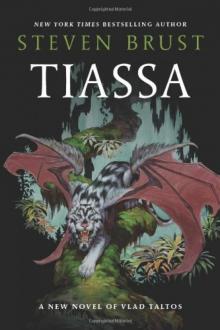 Tiassa
Tiassa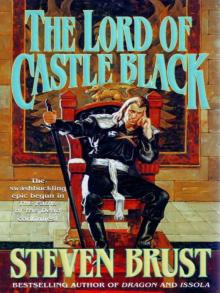 The Lord of Castle Black
The Lord of Castle Black To Reign in Hell: A Novel
To Reign in Hell: A Novel Five Hundred Years After (Phoenix Guards)
Five Hundred Years After (Phoenix Guards) The Book of Dzur: Dzur ; Jhegaala
The Book of Dzur: Dzur ; Jhegaala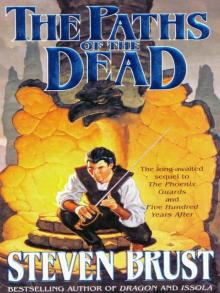 The Paths of the Dead
The Paths of the Dead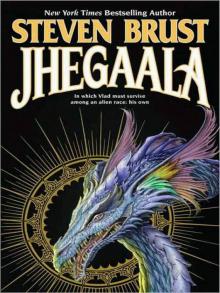 Jhegaala
Jhegaala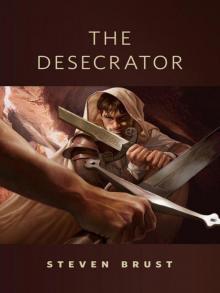 The Desecrator: A Tor.com Original
The Desecrator: A Tor.com Original Agyar
Agyar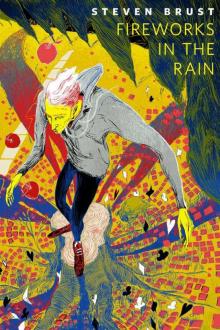 Fireworks in the Rain
Fireworks in the Rain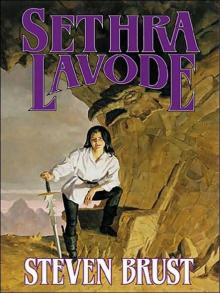 Sethra Lavode
Sethra Lavode The Book of Athyra
The Book of Athyra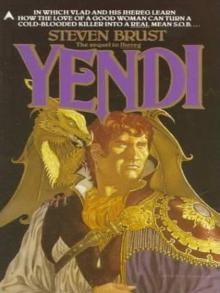 Yendi
Yendi Good Guys
Good Guys The Book of Jhereg
The Book of Jhereg Cowboy Feng's Space Bar and Grille
Cowboy Feng's Space Bar and Grille Sethra Lavode (Viscount of Adrilankha)
Sethra Lavode (Viscount of Adrilankha) My Own Kind of Freedom
My Own Kind of Freedom Dzur (Vlad Taltos)
Dzur (Vlad Taltos) The Lord of Castle Black: Book Two of the Viscount of Adrilankha
The Lord of Castle Black: Book Two of the Viscount of Adrilankha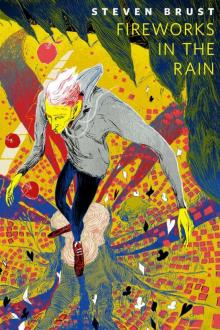 Fireworks in the Rain: A Tor.Com Original
Fireworks in the Rain: A Tor.Com Original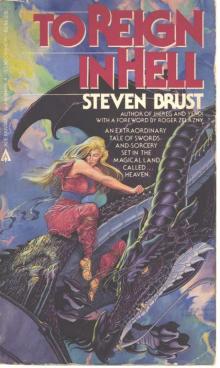 To Reign In Hell
To Reign In Hell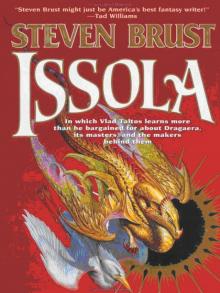 Issola
Issola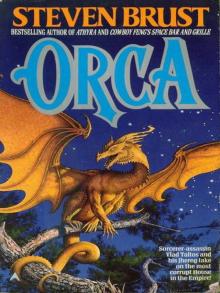 Orca
Orca Issola (Vlad Taltos)
Issola (Vlad Taltos)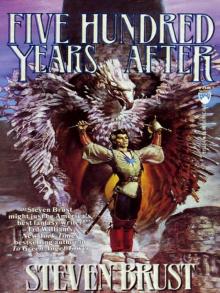 Five Hundred Years After
Five Hundred Years After The Phoenix Guards
The Phoenix Guards Taltos
Taltos![[Vlad Taltos 06] Athyra Read online](http://i1.bookreadfree.com/i1/03/24/[vlad_taltos_06]_athyra_preview.jpg) [Vlad Taltos 06] Athyra
[Vlad Taltos 06] Athyra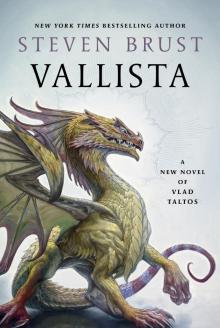 Vallista--A Novel of Vlad Taltos
Vallista--A Novel of Vlad Taltos The Incrementalists
The Incrementalists![[Vlad Taltos 04] Taltos Read online](http://i1.bookreadfree.com/i/03/24/[vlad_taltos_04]_taltos_preview.jpg) [Vlad Taltos 04] Taltos
[Vlad Taltos 04] Taltos![[Vlad Taltos 03] Teckla (v 1.1) Read online](http://i1.bookreadfree.com/i1/03/27/[vlad_taltos_03]_teckla_v_1_1_preview.jpg) [Vlad Taltos 03] Teckla (v 1.1)
[Vlad Taltos 03] Teckla (v 1.1) The Book of Taltos
The Book of Taltos The Paths of the Dead (Viscount of Adrilankha)
The Paths of the Dead (Viscount of Adrilankha) Jhegaala (Vlad Taltos)
Jhegaala (Vlad Taltos)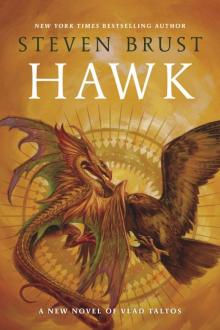 Hawk (Vlad)
Hawk (Vlad)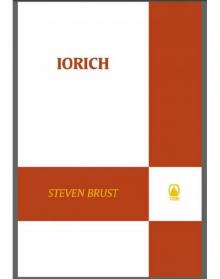 Iorich
Iorich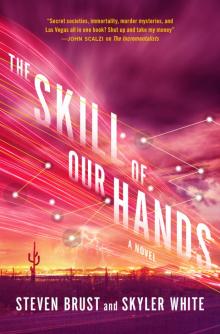 The Skill of Our Hands--A Novel
The Skill of Our Hands--A Novel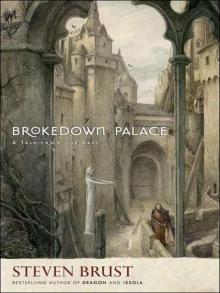 Brokedown Palace
Brokedown Palace Dragon (Vlad Taltos)
Dragon (Vlad Taltos) Dragon
Dragon Athyra
Athyra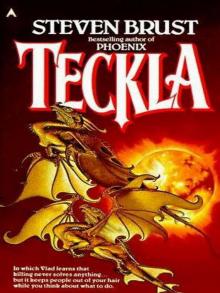 Teckla
Teckla Dzur
Dzur